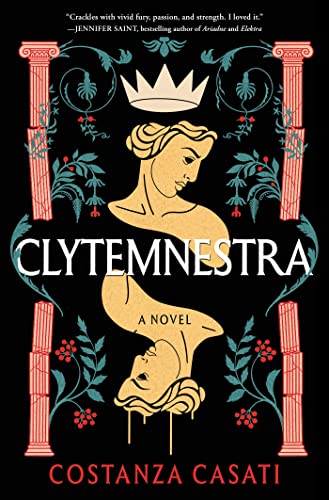![]() Clytemnestra by Costanza Casati
Clytemnestra by Costanza Casati
 Clytemnestra (2023), as the style makes clear, is another entry in the ever-growing genre of Greek myth retellings. Casati does a nice job here of creating tension even within a well-known tale, and has several quite moving scenes, though the book’s somewhat flat style and — for me at least — odd choice of where to end, places it more in the middle tier of similar works.
Clytemnestra (2023), as the style makes clear, is another entry in the ever-growing genre of Greek myth retellings. Casati does a nice job here of creating tension even within a well-known tale, and has several quite moving scenes, though the book’s somewhat flat style and — for me at least — odd choice of where to end, places it more in the middle tier of similar works.
After some a welcome family tree and large cast of characters that also serves to refresh a few details (who raped whom, who cooked whose kids and served them as dinner — all the Greek classics), the narrative opens with a young Clytemnestra alone in the forest in a predator-prey faceoff with a lynx. Since it’d be a pretty short novel otherwise, it’s no spoiler to say she’s the one walking away with a carcass. The scene does a nice job of displaying her abilities, will, and the dance she’ll be dancing for most of her life going forward. It also foreshadows in some of its other details as well, but those events I won’t spoil.
From there we move onto her youth in Sparta, in the court of her father Tyndareus and her mother Leda, along with her siblings Helen (though some say Zeus not Tyndareus is her father while other parental rumors are more worldly), the twins Castor and Polydeuces, Timandra, Phoebe, and Philonoe. Their cousin Penelope also plays a role in the tale. Clytemnestra and Helen are quite close, though things begin to change as potential marriages begin to arise on the horizon. Clytemnestra, much to her surprising pleasure, ends up courted by King Tantalus; Penelope is happy to be wed to Odysseus, while Helen chooses Menelaus despite Clytemnestra and Penelope’s warnings about both him and his brother Agamemnon.
As anyone familiar with Greek mythology knows (spoilers for the millennia-old stories), happiness and peace are short-lived, as Agamemnon eventually kills Clytemnestra’s husband and child and forces her to become his wife instead. The story takes us through her ongoing relationships with her siblings and then with her children Orestes, Electra, and Iphigenia. Then, of course, Helen is taken by Paris off to Troy, leading to even more tragedy for Clytemnestra, though ironically Agamemnon’s absence while he’s off commanding the Greek army for a decade gives her more power than she has ever or will ever have. Eventually she meets up with Aegisthus, with whom she plots her revenge on Agamemnon. The book closes with her husband’s death.
As noted, Casati does a nice job even with the highly familiar beats of the story, carving out scenes of originality and crafting strongly realized characters such that expected scenes, such the death of Iphigenia still carry a good amount of emotional weight, at least where Clytemnestra is concerned. Other characters are a bit more mixed in their depth and thus the impact of scenes focused more on them than the title character. Electra’s response to things toward the end, for instance, felt somewhat rushed into matching what we know happens in the original tales.
As is typically the case in these retellings, what is often glorified or glossed over in the myths (violence, rape, etc.) is cast in a less flattering (or neutral) light. As when, for instance, a very young Helen is kidnapped and raped by Theseus, Tyndareus says they can’t go to war with powerful Athens for “such a reason,” a phrasing that infuriates both Clytemnestra and her brother Polydeuces. Even more so when Tyndareus waves off their anger, noting “Theseus is a hero, and he does what heroes do.” So much for being covered in glory. Agamemnon and his brother come off as mostly brutes, Calchas the seer a manipulative, ice-cold killer of women and children; and even “wise” Odysseus is portrayed as clever, yes, but to sometimes appalling ends.
While Casati does at times turn a nice phrase and employ some vivid detail, overall there was a flatness to some of the prose and narrative that distanced me from the book somewhat. I also felt at times the writing was bit too overt, where I would have preferred picking up on things without them being revealed by the interior narrative or sometimes the dialog. Finally, I felt a bit mystified by choosing to end the story so soon after Agamemnon’s death, with so much dramatic potential left on the table. And the more or less triumphant (only partially so, admittedly) close feels more than a little odd given what I assume most of her readers knows is coming.
We’ve seen a run of these sorts of stories, to greater and lesser extent. While Clytemnestra doesn’t match the best in this genre, such as Pat Barker’s The Silence of the Girls or Madeline Miller’s Circe, it’s a worthy entry into the field with a strongly conceived character as its central strength.



I absolutely loved your insights on Foundryside! The blend of action and character development really struck a chord with me.…
so you're saying I should read it? :)
This blog post beautifully captures the essence of Edwige Fenech's contribution to the giallo genre! Her performances are so captivating,…
As a native New Yorker, I love the idea of the city being filled with canals and no skyscrapers! And…
How did I miss this? Thanks for bringing it to my attention!